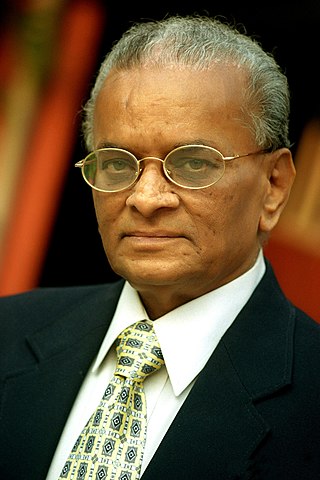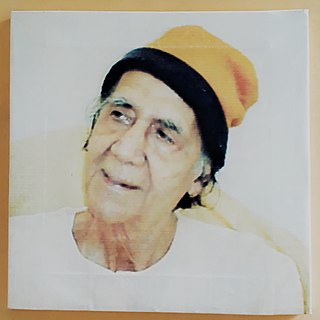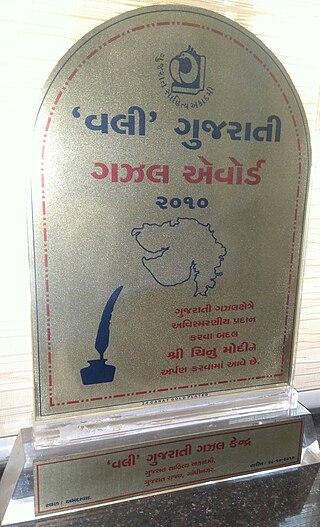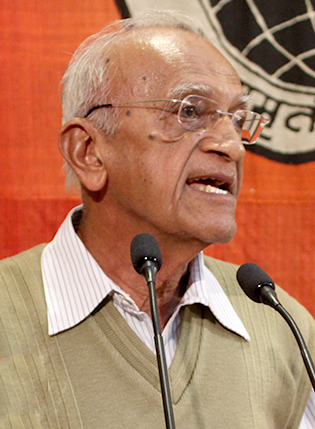Related Research Articles

Gujarat is a state along the western coast of India. Its coastline of about 1,600 km (990 mi) is the longest in the country, most of which lies on the Kathiawar peninsula. Gujarat is the fifth-largest Indian state by area, covering some 196,024 km2 (75,685 sq mi); and the ninth-most populous state, with a population of 60.4 million in 2011. It is bordered by Rajasthan to the northeast, Dadra and Nagar Haveli and Daman and Diu to the south, Maharashtra to the southeast, Madhya Pradesh to the east, and the Arabian Sea and the Pakistani province of Sindh to the west. Gujarat's capital city is Gandhinagar, while its largest city is Ahmedabad. The Gujaratis are indigenous to the state and their language, Gujarati, is the state's official language.

Kanhaiyalal Maneklal Munshi, popularly known by his pen name Ghanshyam Vyas, was an Indian independence movement activist, politician, writer from Gujarat state. A lawyer by profession, he later turned to author and politician. He is a well-known name in Gujarati literature. He founded Bharatiya Vidya Bhavan, an educational trust, in 1938.

Chandrakant Keshavlal Bakshi was an Indian Gujarati-language author from Gujarat, India and a former Sheriff of Mumbai. He was known for his bold and new concepts in writing during his time in Gujarati literature. He is also addressed as Bakshi or Bakshibabu. Born in Palanpur, he completed higher education and had a business in Calcutta. He started writing there and later moved to Mumbai for his teaching career. He wrote 178 books, and wrote extensively in newspaper columns.

Ganesh Narayandas Devy is an Indian cultural activist, literary critic and former professor of English. He is known for the People's Linguistic Survey of India and the Adivasi Academy created by him. He is credited with starting the Bhaashaa research and Publication Centre. He writes in three languages—Marathi, Gujarati and English. His first full-length book in English is After Amnesia (1992). He has written and edited close to ninety books in areas including Literary Criticism, Anthropology, Education, Linguistics and Philosophy.
The Gujarati people, or Gujaratis, are an Indian ethnolinguistic group who reside in or can trace their ancestry or heritage to a region of the Indian subcontinent primarily centered in the present-day western Indian state of Gujarat. They primarily speak Gujarati, an Indian language. While Gujaratis mainly inhabit Gujarat, they have a diaspora worldwide. Gujaratis in India and the diaspora are prominent entrepreneurs and industrialists and maintain high social capital. Many notable independence activists were Gujarati, including Mahatma Gandhi and Vallabhbhai Patel.

Hinduism is a minority faith in Kenya, constituting 0.13% of the population of Kenya. Due to the efforts of the Hindu Council of Kenya, Kenya is one of only three African countries to recognise Hinduism as a religion. Hindus are free to practise their religion in Kenya, and several Kenyan cities have Hindu temples. The Hindu temples in Kenya are mostly of north and west Indian architectural style.
Abhijat Joshi is an Indian screenwriter, film director, producer and editor who works in Hindi cinema. His is known for collaboration with Vinod Chopra Productions and director Rajkumar Hirani, as the screenwriter for Lage Raho Munna Bhai (2006), 3 Idiots (2009), PK (2014) and Sanju (2018). He is a professor of English at Otterbein University in Westerville, Ohio, since 2003.

Indians in Kenya, often known as Kenyan Asians, are citizens and residents of Kenya with ancestral roots in the Indian subcontinent. Significant Indian migration to modern-day Kenya began following the creation of the British East Africa Protectorate in 1895, which had strong infrastructure links with Bombay in British India. Indians in Kenya predominantly live in the major urban areas of Nairobi and Mombasa, with a minority living in rural areas.

Kumarpal Balabhai Desai is an author, critic, editor, journalist, columnist and translator from Gujarat, India. He studied and later taught at the Gujarat University. He is associated with several social and Gujarati literary organisations such as Gujarati Sahitya Parishad. He has written and edited more than hundred books including biographies and several works on Jainism. He was awarded the Padma Shri in 2004.
Manilal Premchand Chandaria OBE CBS EBS is a Kenyan businessman of Indian descent who was born in Nairobi. He is a senior member of the Comcraft Group of Companies, a billion dollar enterprise that has a presence in over 40 countries, and is on the boards of several prominent East African companies. He has won several awards in East Africa and internationally in recognition of his entrepreneurial endeavours and is also a noted philanthropist. In 2003, Chandaria was awarded the Order of the British Empire (OBE) by Queen Elizabeth II. In December of the same year, he was awarded the Elder of the Burning Spear by former president Mwai Kibaki, one of the highest civilian honours in Kenya. He has been hailed as "one of Kenya's leading industrialists".

Makarand Dave, also referred as Sai Makarand Dave, was a Gujarati poet and author from Gujarat, India.

Shrenik Kasturbhai Lalbhai was an Indian industrialist and philanthropist. After completing courses of study at the Massachusetts Institute of Technology and Harvard University in the United States, he joined the family business, a conglomerate of companies spanning multiple industries. He also served on the governing councils of a number of cultural, educational and religious institutions.

Anandghan was a 17th-century Jain monk, mystical poet and hymnist. Though very little is known about his life, his collection of hymns about philosophy, devotion and spirituality in vernacular languages are popular and still sung in Jain temples.

Harivallabh Chunilal Bhayani was a linguist, researcher, critic and translator from India.

Amrit Keshav Nayak was a Parsi theatre actor-director, lyricist and Gujarati author. He joined theatre at early age and later directed several plays including adaptations of plays of Shakespeare. He wrote plays and novels also.

Abhishek Jain is an Indian film director and producer known for his Gujarati films Kevi Rite Jaish, Bey Yaar, and Wrong Side Raju. In 2021, he made his debut in the Hindi film Hum Do Hamare Do.

Sunil Shivaji Khandbahale is a MIT Sloan Fellow, Innovator and Entrepreneur from Nashik, India. He is the founder and CEO of KHANDBAHALE.COM, a free multilingual digital dictionary and translation platform for 23 languages, with a vocabulary of 10 million words and phrases. He is a regular technology and innovation columnist for national and international media.

Vali Gujarati Gazal Award is a literary honour in Gujarat, India. The award was instituted in 2005 by Vali Gujarati Gazal Kendra, run by Government of Gujarat, to perpetuate the memory of 17th century poet Vali Gujarati. The Award is conferred annually to the Gujarati ghazal poets.

Gujarati Americans are Americans who trace their ancestry to Gujarat, India. They are a subgroup of Indian Americans.

Ratilal Mohanlal Borisagar is a Gujarati humourist, essayist and editor from Gujarat, India. Born and educated in Savarkundla, he received a PhD in 1989. After working for some years as a teacher, he joined the state school textbook board until his retirement in 1998. He started his writing career as a story writer, but eventually gained acclaim as a humourist. He published several humour collections and humour novels, including the acclaimed book Enjoygraphy. He edited several works of children's literature and humour literature. In 2019, he received the Sahitya Akademi Award for his essay collection, Mojma Revu Re.
References
- 1 2 3 4 "Gujarati Lexicon founder Ratilal Chandaria no more". Daily News and Analysis . Ahmedabad. 2013-10-15. Retrieved 2014-02-25.
- 1 2 3 4 5 "Obituary: Shri Ratilal Premchand Chandaria". Institute of Jainology. 2013-10-16. Retrieved 2014-02-25.
- 1 2 3 4 "GujaratiLexicon founder Ratilal Chandaria passes away". The Indian Express . 2013-10-15. Retrieved 2014-02-25.
- ↑ "Bhagwadgomandal goes online". The Times of India . 2009-04-04. Retrieved 2014-02-25.